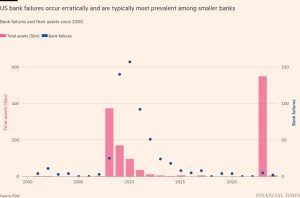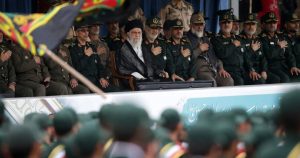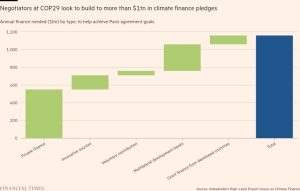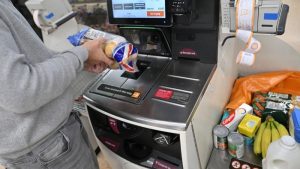Why the EU fears a major war in Lebanon
This article is an on-site version of our Europe Express newsletter. Premium subscribers can sign up here to get the newsletter delivered every weekday and Saturday morning. Standard subscribers can upgrade to Premium here, or explore all FT newsletters
Good morning. Today, I report on European countries’ fears regarding the widening conflict in the Middle East, and my Brussels colleague reveals new research that suggests moves to protect the EU’s car industry from foreign competition could hurt the fight against climate change.
Contagion
European capitals are increasingly concerned about the long-term ramifications of the widening conflict in the Middle East, as Israel steps up its offensive against Lebanon and the Hizbollah militant group based there.
Context: Israel has bombed Hizbollah targets in Lebanon for more than a fortnight and this week launched a ground invasion of the country’s south. The killing of Hizbollah’s leader Hassan Nasrallah and other senior officials saw Hizbollah’s ally Iran respond with a massive ballistic missile salvo against Israel on Tuesday.
Iran’s attack has dramatically raised the risk of a full-scale war enveloping the entire region, and prompted a snap G7 leaders virtual meeting yesterday, in which they “agreed to work jointly to foster a reduction in regional tensions . . . [and] reiterated that a region-wide conflict is in no one’s interest and that a diplomatic solution is still possible”.
Western capitals are pressuring Israel to focus any counterattack against Iran on military targets in the country, and not its oil or nuclear research facilities, people familiar with the talks said.
While the Iranian missiles have raised the stakes, the ongoing Israeli assault on Lebanon, including the bombing of southern Beirut and elite commando incursions across the border, had already spooked EU officials.
Lebanon is just over 160km from EU member Cyprus and has historic links to European countries such as France and Italy. The EU has provided the country with more than €3.5bn in aid since 2011, including support to its armed forces.
Sixteen of the EU’s 27 member states currently have their troops in Lebanon as part of the UN’s peacekeeping mission in the country, including more than 1,000 Italian soldiers and more than 600 each from France and Spain.
EU capitals are also fearful of the potential refugee crisis a major, long-lasting war in Lebanon could cause, and how an increase in people fleeing the Middle East could impact domestic politics — given the already heightened anti-migration sentiment in many European countries.
Chart du jour: Rebound?
The tailwinds for a European consumer recovery are building, writes Gerry Fowler, if interest rate cuts support a rise in spending on durable goods.
Reality check
A day before a planned vote on whether the EU should impose tariffs on electric vehicles from China, one of Brussels’ most influential think-tanks has warned such a move could imperil the green transition, writes Daria Mosolova.
Context: EU member states are scheduled to vote tomorrow on imposing additional tariffs on cheap Chinese electric vehicles, in a move to protect European carmakers from what they view as unfair competition.
Analysts at Bruegel cautioned that the cost of clean technology will be a key factor determining the success of Europe’s decarbonisation, and warned about the wider impact of trade battles in a report published today.
The report argues that as the EU reframes its competition rules, it cannot ignore that China is the global leader in markets for batteries and critical raw materials, both of which are crucial for the EU’s green transition.
“Reduced imports from China of these products, because of competitiveness concerns or economic security, imply the risk of both slowing down the energy transition and increasing its cost”, the authors wrote.
“Economic de-risking may increase climate risk,” they added.
The authors also warned that the EU’s new budget rules, as well as capital constraints due to high interest rates, could limit countries’ capacities for much needed green investment — especially as other spending needs like defence become more important.
The EU aims to slash its greenhouse emissions by 90 per cent by 2040 compared with levels in 1990, which would require yearly investments into the energy system of about €700bn from 2031 to 2040 — roughly 3 per cent of the bloc’s GDP.
What to watch today
-
G7 interior ministers meet in Mirabella Eclano, Italy.
-
German Chancellor Olaf Scholz gives a speech on the 34th anniversary of German unification in Schwerin.
Now read these
Recommended newsletters for you
Trade Secrets — A must-read on the changing face of international trade and globalisation. Sign up here
Swamp Notes — Expert insight on the intersection of money and power in US politics. Sign up here
Are you enjoying Europe Express? Sign up here to have it delivered straight to your inbox every workday at 7am CET and on Saturdays at noon CET. Do tell us what you think, we love to hear from you: [email protected]. Keep up with the latest European stories @FT Europe
#fears #major #war #Lebanon





